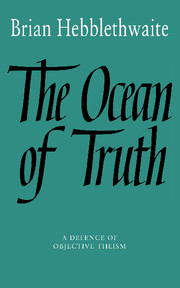Book contents
- Frontmatter
- Contents
- Preface
- 1 Christian belief in God
- 2 The ebbing of theistic faith
- 3 The interiorisation of faith
- 4 Theism in the modern world
- 5 The significance of Kant
- 6 The grounds of theistic belief
- 7 The question of truth
- 8 Religions – theistic and non-theistic
- 9 Life after death
- 10 The Christian Church and objective theism
- Appendix: The Church's ministry
- Notes
- Select bibliography
- Index
4 - Theism in the modern world
Published online by Cambridge University Press: 06 July 2010
- Frontmatter
- Contents
- Preface
- 1 Christian belief in God
- 2 The ebbing of theistic faith
- 3 The interiorisation of faith
- 4 Theism in the modern world
- 5 The significance of Kant
- 6 The grounds of theistic belief
- 7 The question of truth
- 8 Religions – theistic and non-theistic
- 9 Life after death
- 10 The Christian Church and objective theism
- Appendix: The Church's ministry
- Notes
- Select bibliography
- Index
Summary
My double aim of showing both the idiosyncrasy and the falsehood of a purely expressivist view of Christianity will now be advanced by a survey of alternative options. I shall sketch in this chapter a number of current movements and thinkers in modern Christian theology and philosophy of religion in order to provide a more balanced idea of the possibility of theism in the age of science.
We may begin with the names of the two German-speaking Protestant theologians who dominated mid twentieth-century Christian theology, Rudolf Bultmann and Karl Barth. We may not find ourselves in complete agreement with either of these writers, but they are both worth taking very seriously indeed, not only because of their enormous range and inherent stature as Christian thinkers, but also because each, in his different way, was conscious of the problem set for Christian faith by post-Enlightenment modernity, including the historical critical method in its application to the Bible. But they were both also highly conscious of the claims of God and his Word. Their interest and importance lie in the ways in which they tried to bring a powerful theology of the Word to bear upon modern man and modern culture.
Rudolf Bultmann has been criticised, no doubt rightly, for an excessive reliance on existentialist philosophy, an uncritical acceptance of a closed mechanistic view of physical science, and an excessively radical use of critical method in the interest of ‘demythologising’ the Christian gospel as found in the New Testament writings.
- Type
- Chapter
- Information
- The Ocean of TruthA Defence of Objective Theism, pp. 53 - 70Publisher: Cambridge University PressPrint publication year: 1988



